Kudzu Madness & A Drive Up Hwy 49 To The Delta – The Uncut Chapter
The following is the complete chapter I wrote for Perfect Killer. Most of this was cut by the publisher who felt that nobody really cared about “all that Southern stuff.”
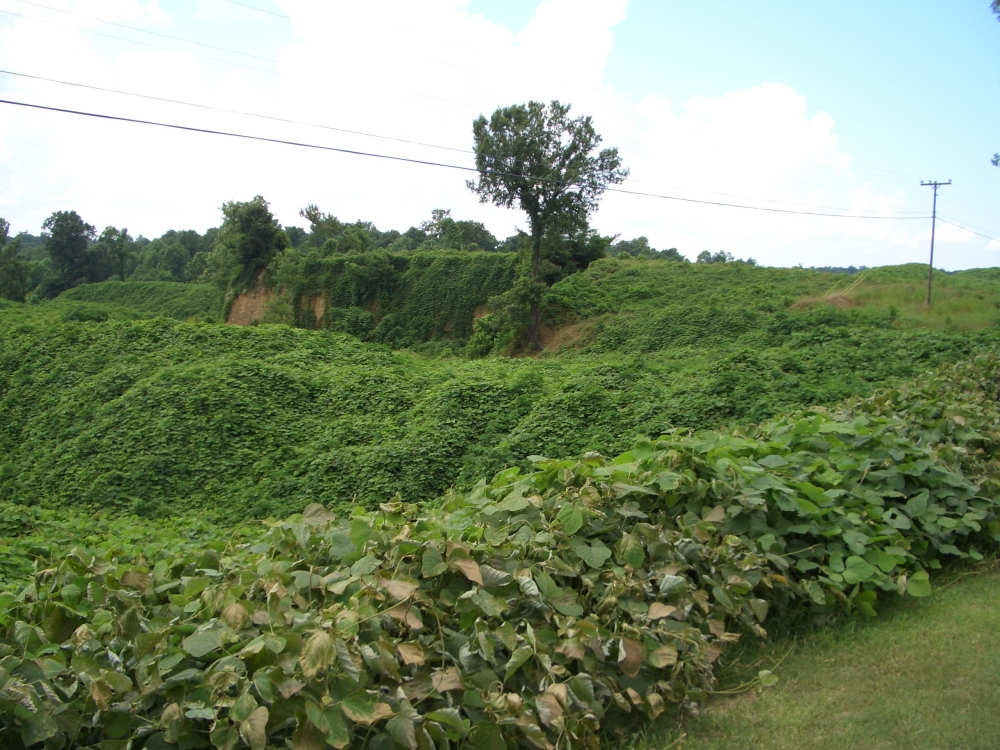
Kudzu covers the landscape like green lava. Right click to view larger image
In fairness, the publisher wanted a straight-forward thriller without “all that Southern stuff” as well as the ethics, science and faith around free will, good and evil and how people do the right thing and — especially — how and why basically good people tolerate evil.
In retrospect, the “Southern stuff” and the good/evil discussions do slow down the action. But Perfect Killer is a very special book to me. It’s about my heritage, the culture I was born into and ultimately rejected.
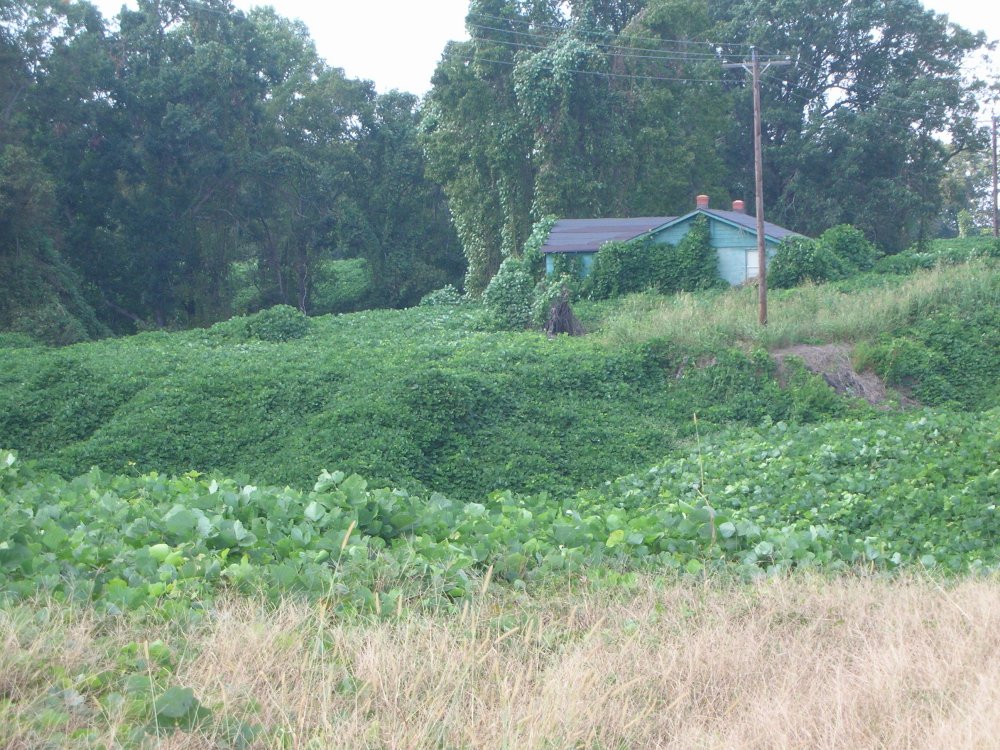
Kudzu will eat all of this house. Right click to view larger image
Why Deal With “Important Issues In Genre Popular Fiction?
I’ve often been asked why I’ve chosen to write about “important” issues in genre popular fiction. I certainly could have bagged all the thriller stuff and written a more straightforward Southern novel with all its ethical and cultural implications. Daughter of God was in the same vein as well as Slatewiper, both of which dealt with religion, ethics and the old good and evil thing.
But I feel that popular fiction reaches more people than “serious” fiction. I always set out to entertain, but also try to offer some side trips that educate and make people think.
I parted company with my former publisher over these and other significant issues. In the end, the published version of Perfect Killer was cut by more than one-third. I happen to think that some of the best parts were deleted. So, now that I have the rights back, I can offer those words to you, uncut.
This chapter is the hero’s homecoming. His thoughts here are my thoughts from my homecoming. This chapter refers to Vanessa’s death. That was described in this previous post.
Kudzu & A Drive Up Highway 49 To The Delta – The Uncut Chapter
Robert Johnson’s artfully unadorned guitar notes filled the cab of my rented pickup as I raced north along Highway 49 through the kudzu-smothered hills south of Yazoo City.
The CD had been on sale cheap airport gift shop on my stop-over. I had loved Johnson’s tunes since I was a teenager and had never seen this collection before. The CD faithfully reproduced all the static and scratchiness of the ancient recording, but through the noise came the genius of Johnson’s blues guitar and the transcendent depth of the lyrics which were nothing less than philosophy stripped of the usual pretensions. Legendary blues masters like Johnson, Skip James and Mississippi John Hurt had a way of owning my imagination.
I got to keep moving, I got to keep moving
Blues falling down like hail, Blues falling down like hail
Uumh, Blues falling down like hail. Blues falling down like hail
And the days keeps on worryin’ me
There’s a hellhound on my trail,
hellhound on my trail, hellhound on my trail.
I thought of the hellhound that had killed Vanessa and laid waste to my life in California. No name to this hound, no breed, no face, it was all fangs and death without form, terrifying in its obscurity. Over and over again in my mind, I walked through the pieces of the puzzle, my boat, Mama’s funeral, the attack at home. I ransacked every thought, desperate for some dim unremembered key to the deadly puzzle that was closing in on me as the only logical suspect. So far the links to Talmadge were way too speculative for any logical leap of faith.
A semi rapidly filled up my rearview mirror and, despite the fact that I was hitting almost 80, blasted past me with a shock wave that made my white Ford F150 shudder and sent my thoughts swerving away from the hellhound and back to the instant moments falling all about me.
Outside, the kudzu-smothered landscape rushed past like a creeping green shroud draped over everything — utility poles, abandoned barns and houses and everything in between, even the tallest of trees. To a vivid imagination, the trees looked like giant undead mummies trailing their scattered rags slowly over the hills. The images were especially real on full-moon-lit nights when a gentle breeze would animate the shadows and send a chill through even the most skeptical. In the bright late-morning sunlight, the trees looked merely creepy.
Early this mornin’
When you knocked upon my door.
Early this mornin’, ooh
When you knocked upon my door
And I said, ‘Hello Satan.”
I believe it’s time to go
I listened to the beginning of Robert Johnson’s Me and the Devil Blues I and imagined how I could see something evil making its way through the landscape here. Even though Johnson was a man of the Delta’s flatness, his words and music spoke to more universal fears.
It had been decades since the last time I had driven this road, and back then it had been a narrow, two-lane patchwork of cracked, tar-sealed concrete with no shoulder that slashed through the kudzu jungle, abruptly ascending and dropping like a cheap roller coaster as the highway’s thick expansion joints thwapped an endless iambic k-dunk, k-dunk, k-dunk against the tires.
Highway 49 was four-lanes now, with healthy shoulders that led on to a broad demilitarized zone cleared of the aggressive imported Asian vine that could grow up to a foot per day. Kudzu had been widely planted to control soil erosion back in the 1930s and could invade a farm and occupy it in a single growing season.
Poet James Dickey called it a “Green, mindless, unkillable ghost,” and there were legends of unwary farmers found strangled in their beds because they fell asleep with the windows open. I had read once that it was actually a useful plant — a source of Asian medicines and a nutritious forage for livestock, which enriched the soil with nitrogen-fixing roots. Many useful things become toxic when transplanted out of their native environments.
All of these characteristics no doubt contributed to the way Kudzu had grown into a cultural metaphor for Southern society, although no one could quite agree on the meaning. Sometimes I thought the green creeping carpet had to do with manners and sugar-sweet hospitality gone wild.
Other times, I felt perhaps it had something to do with the fact that the kudzu was like a giant slip cover tossed over the suppurating wounds of grinding poverty. It screened the ramshackle abandoned buildings with a deceptively attractive green mask that hid the deep metastasizing gullies in the red clay hills that burned like raw open sores in the earth. Kudzu was also a relentless, intractable adversary much like poverty and racism. It was probably all these things and more.
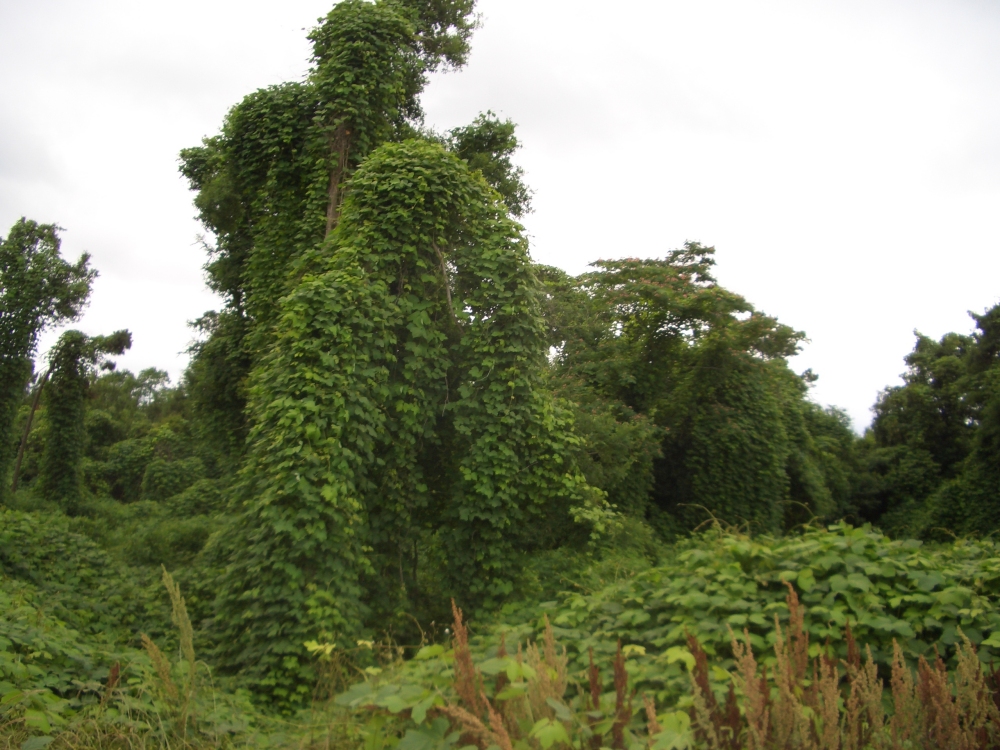
Kudzu rules. Right click to view larger image
As a teenagers we talked endlessly about exploring one of the farms overgrown with kudzu, wading through the green surf to see if there were actually bones laying in old farmhouse beds. I had once read that kudzu was as healthy for the land and for cattle as alfalfa, but the rumors among the gullibly ignorant held that it could reach out and kill an entire herd in the middle of the night.
I went to the crossroad,
Fell down on my knees
Asked the Lord Above “Have Mercy, now
Save poor Bob if you please.
Mmmmmmm
Johnson’s raspy voice scratched out Cross Road Blues, supposedly his lament after selling his soul to the Devil in exchange for his supernaturally superb guitar ability.
Mmm, the sun goin’ down, boy
Dark gon’ catch me here
As I approached the southern outskirts of Yazoo City, signs appeared pointing to 49E veering off to northeast. The bifurcated Highway 49s would almost parallel each other for another 80 miles, describing a very long, very thin diamond sliver that bounded much of my early life.
Tell my friend-boy Willie Brown
Lord that I’m standin’ at the crossroad, babe
I believe I’m sinkin’ down
Staying on 49 would take me through Midnight, Silver City and Belzoni to Indianola at the western point of the diamond where Saints’ Rest, one of the Judge’s plantations was located. Saint’s Rest had been sold in the 1950s to a big planter in the oil business. I inherited part the plantation, but I was disinherited when I led that civil rights march at Ole Miss.
A little farther on, 49 would pass through Ruleville where my mother’s sister had lived and died and up through Parchman Prison, the Devil’s Island of the Delta. Finally, Highway 49 healed itself with 49E up in Tutwiler, just north of Sumner where an all-white jury back in the mid-1950s had acquitted the killers of Emmett Till who had been tortured to death for the crime of being a black teenager. I was about six years old at the time, but I don’t remember much specific about all this other than the fact that there were a lot of visitors and hushed conversations behind the closed doors to the breakfast room in the Judge’s house in Itta Bena.
I remembered those meetings very well because at the time, my mother and I were living in a small apartment attached to the main house that the Judge built for us when Mama separated from my father. It was the beginning of a stormy decade in which they divorced and married each other three times before ultimately marrying someone else for the fourth time.
I remember crying for my Papa, absent through separation, divorce and a heavy work travel schedule that kept him away at least two weeks per month even when he and Mama were married. What Papa and I did together was rare and episodic. I went on trips with him to New Orleans exactly four times, two times when he was working and twice to watch Ole Miss win the Sugar Bowl. We went dove hunting three times and once for ducks. I remember those eight events primarily because they were so very special but also because eight things are not all that hard to keep in mind.
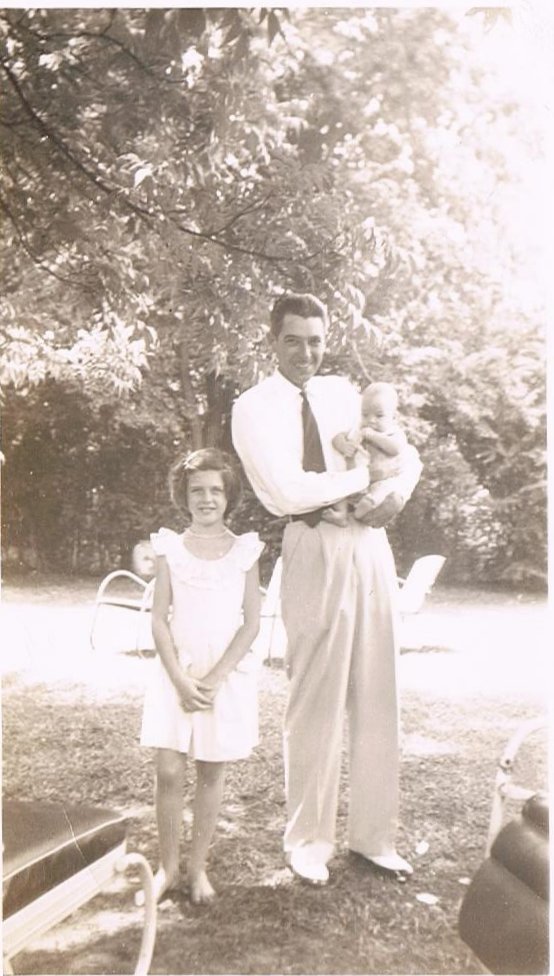
My Papa, my sister Suan, me when I was about three months old and in the background, the pecan tree from which Al Thomas saved me about five years later
What I remember about my father is limited but intense. He was a tall thin man with a stiff, almost fragile bearing which never forgot his mostly successful bout with polio in the 1920s. The resulting constant back pain meant that he and I never played toss with a baseball or football or wrestled and roughhoused. That didn’t keep him from brave, honorable service in the Philippines in World War II, a time he never liked to talk about.
He was a frustrated contradiction where opposing cultures collided. On the one hand, he was a man’s man and wanted me to be sure to be capable, self-sufficient and accomplished in the ways of toughness and self defense, accomplished with force but aware it was a last resort to be employed with victorious regret. On the other hand, he came from a family of academics, professors, doctors and a president of two universities.
The Great Depression and the Faulknerian loss of he family wealth left him with no university education and that hurt him deeply. I also think it accounted for his attachment to his ancestors and his penchant for trying to bask in the aura of their success. In that respect, he was a pretty good metaphor for the Southern Shinto of post-Civil War Mississippi that still annoys me to this day.
Despite that, I loved Papa deeply whenever I was with him. I can remember to this day how he always smelled of Old Spice and Camels. The cigarettes railroaded him into a series of long, dark, painful and humiliating final days living mutely with a tracheotomy where the cancer had eaten his larynx away.
I would like to have known my father better, but he died before that could happen.
While it never made up for having Papa to hug, living in the suite of rooms the Judge built for Mama and me in Itta Bena was pretty exciting. I enjoyed the run of the Judge’s big house and yard with the giant sycamores along the street in front, the massive pecan tree out back, the tulips that blazed along the driveway in the spring, a pen full of blue tick hounds, and, of course Lena Gray and Al Thomas, who served as cook/housekeeper and chauffeur/gardener. I owed my life to Al Thomas.
Although I don’t remember the exact event itself, Al and I became something of a family legend that was repeated over and over so often that I could almost convince myself that I did have a memory of it. But as the story goes, after going to a cowboy movie matinee, I decided that hanging myself would be cool. So I took apart the rope swing on the pecan tree, tied a damn good noose for a five year old, stood on my tricycle and nearly choked to death.
As the legend was so often retold, Al Thomas watched the entire thing from the screened-in back porch by the door leading to the Judge’s kitchen. He called Lena out to watch and she immediately told him to go stop me. Despite her near hysteria, Al steadfastly waited until I was actually choking before rescuing me.
“If I stop him before he gets a taste for things, he’ll just try it again some other time when nobody’s watching and he’ll succeed.”
He was a wise man to be sure, but to this day, I fight panic when cinching up a necktie.
All those memories waited for me up the exit for 49E which would eventually get me to Greenwood. Not long after I took the turn in Yazoo City, the four lanes narrowed to two then fell in one single steep grade from a textured land of kudzu-covered hills, contours and modeling to one dominated by the table-flat elevations of a hundred merging flood plains. There was nothing subtle about arriving in the Delta, no mistaking the act of entering another world where the kudzu was gone but its smothering spirit ruled.
Train tracks heavy with long snakes of hoppers, boxcars, flatbeds and log carriers joined up parallel with the highway north of town. The traffic thinned quickly here and I found myself the middle vehicle in a group of three pickups. The patchwork of freight cars quickly fell behind as we accelerated past 75 miles per hour on this old, curvy, tree-lined, two-lane with no shoulders and barely wide enough for two pick-ups to pass without taking off the side mirrors.
The highway and parallel train tracks flirted with the base of the hills until we got to Eden where 49E ricocheted north-northeast, off toward the heart of the Delta. Our new trajectory ran atop a steep berm that would usually keep the road surface above the waters of creeks and rivers that escaped their banks every winter and spring. Below the berm, I passed cotton in various stages of development.
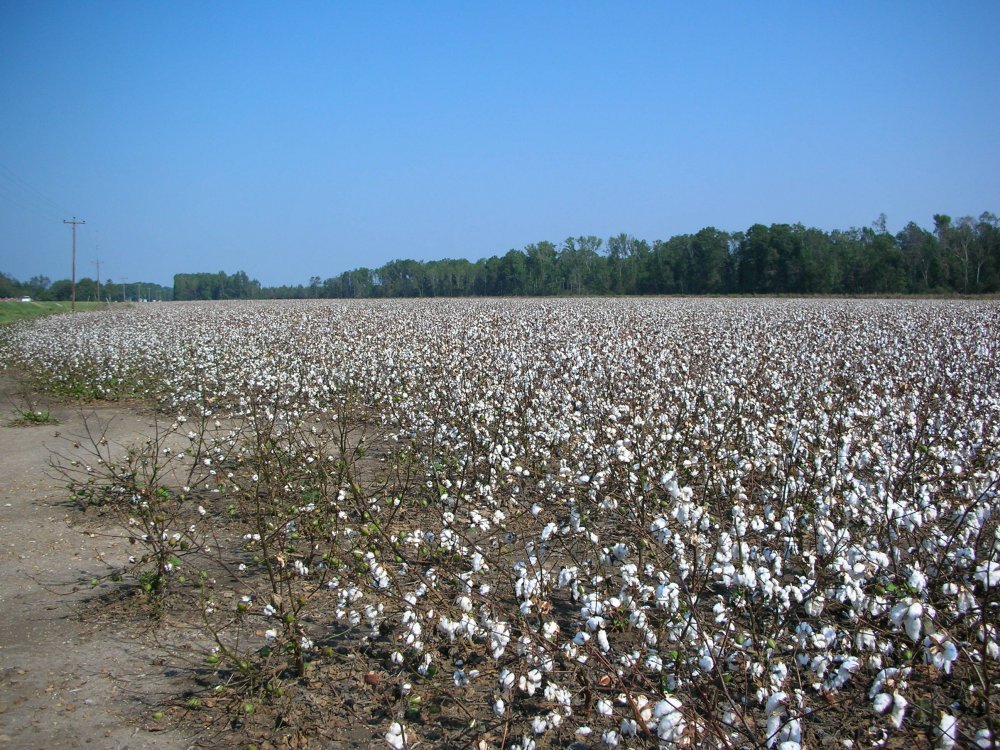
Cotton, late. Right click to view larger image
There was standing water in many of the fields, testament to a period of unusually high rainfall this year. The cotton and soybean fields were soaked with water off the Gulf of Mexico transported by a roaring freight train of ferocious thunderstorms that just wouldn’t quit. The rice and catfish farmers had no trouble, but I could see this would be a horrible year otherwise if the fields didn’t dry out. The storms also brought tornadoes that scraped the land clean.
In the higher, drier fields, the plants were shoving toward thigh-high and colorful with flowers. As a child, I had marveled how cotton blossoms opened white one day, closed up that night and re-opened the next day all deep reddish pink for the next day or so until they dropped off.
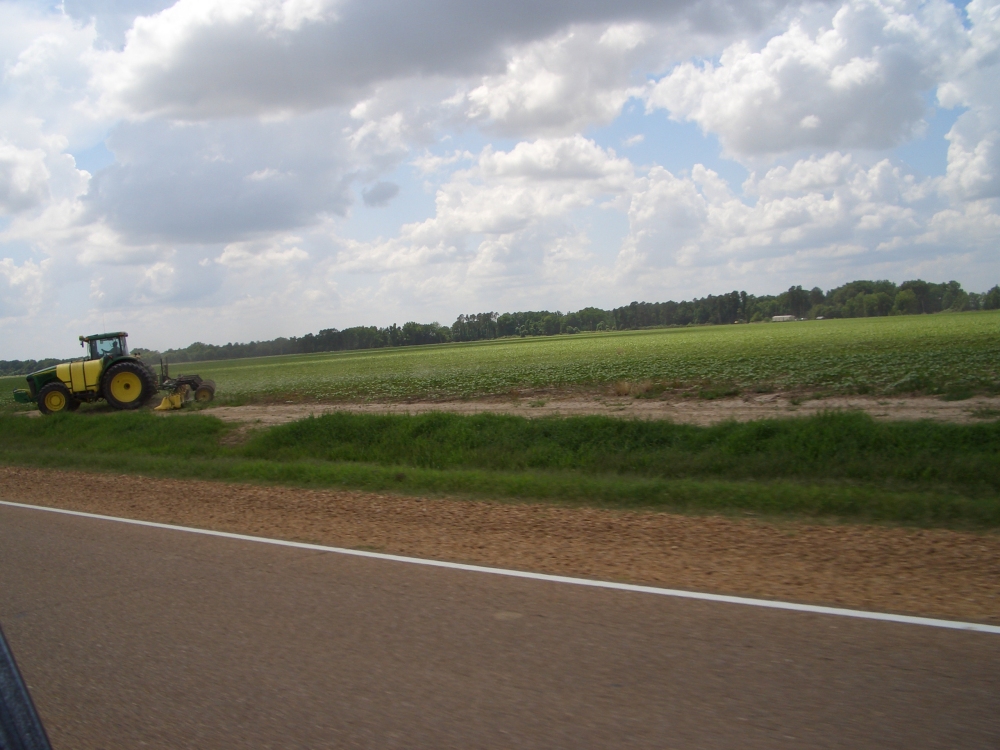
Cotton, early. Right click to view larger image
And everywhere I looked, the landscape was the same: fields of developing cotton punctuated by rows of trees marking streams, sloughs, and oxbow lakes that could not be cleared for crops. We passed over bridge after bridge spanning water carpeted thick with duckweed and still enough to support malaria. Ironically, I could see the dust pointing to vehicles in the higher spots, places where the brutally hot sun baked the surface dry and leaving the standing water around it a warm, perfect incubator for mosquito larvae.
One of Mama’s favorite stories she told so often was how, during her early childhood in the late Teens and 1920s, Mr. Durham, who owned one of the two drugstores in town, would mix quinine with Coca-Cola and chocolate syrup as a “spring tonic” for her and the other children in town as a prophylactic against the mosquito-borne disease. I do know that the best attempts at mosquito abatement must not have been all that successful because by the time I was a kid, I remember getting vaccination shots for Yellow Fever, a barely better behaved but still nasty hemorrhagic cousin of Ebola.
The first time Highway 49E straightened out, the pick-up in my rearview mirror accelerated past me and the truck I followed. He quickly disappeared around the next curve. I eased off the accelerator then and dropped back a few more truck lengths until I was almost alone with my thoughts and the gathering thunderheads to the northeast which had started reaching for the stratosphere even though it was not quite noon.
More storms, more rain, more misery.
When the highway broke free of the trees, I was struck by how all the thunderheads looked like great angry Confederate privateers with storm-bellied sails filled with the capricious fury of lightning, tornadoes and hail looking for targets. I remembered hikes in the woods when these would gather unseen past the limbs and leaves.
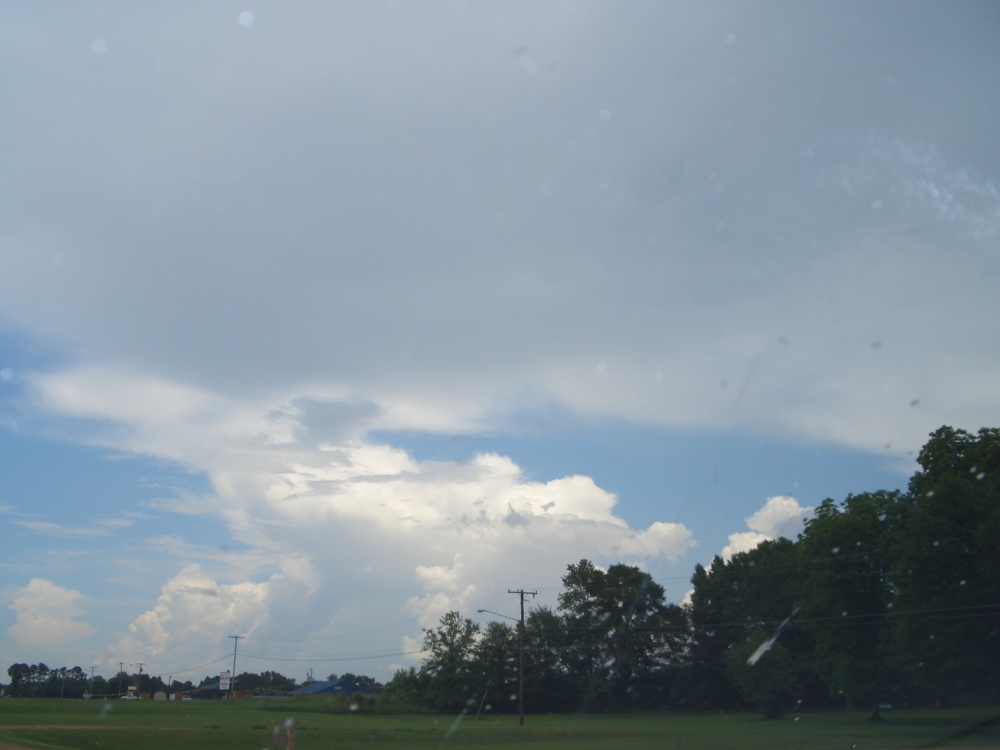
Storm clouds gather. Right click to view larger image
The storms would announce themselves first with the distant low rumble of thunder that said, “head home.” That was reason for a fast walk, but it was the sudden blast of cool air like the opening of God’s own ice box that would send me into a dead run, because that was almost always followed quickly on by the sursurrating rush of heavy rain marching through the woods in pursuit. It sounded like some big animal pushing through the leaves and brush and that made me run faster and faster, especially when the interval between the lightning and thunder came like my racing heartbeat.
Sometimes I beat the rain, sometimes not. Once I saw lightning take out a dead tree less than fifty yards away once and almost urinated in my pants. Then, when I was about 16, I huddled in a gully as a tornado passed overhead and made the ground tremble; it sounded like every B-52 in the world charging down the runway toward takeoff with a full load and every engine straining. I’m fine if I never hear that again.
With the past ringing in my head, I spotted a small settlement ahead scattered on both sides of the highway with a water tower, a gas station and store with a driveway of loose beige gravel. I slowed as my truck passed old black men in blue overalls sitting still on the sagging porches of gray weather-bleached shacks with rusty tin roofs. Three gray-brown pigs rooted along the road shoulder. In the distance, a dust contrail plumed across a field, pointing at the pick-up which had passed me.

Piggly Wiggly. Right click to view larger image
Once past the settlement, I sped up and began a weaving drunk’s game of dodging road kill — possums, dogs, skunks, raccoons. In the next ten miles, I marveled at the fact that I had passed more red meat in the highway than you could find at the butcher case at Piggly-Wiggly. Even with the air conditioning on recirculate, I could tell that some of the animals had been fermenting in the hot sun for days.
I was making good time up 49E, chasing heat mirages that looked like fleeing desert ponds in the road ahead and thinking about how Talmadge was most likely the key to this whole mess when my cell phone rang. I hoped it was Jasmine, but when I looked at the incoming number display I recognized it as Rex’s. I reached over and turned the CD’s volume down.
“Hey man,” I said.
“ Hey y’own damn self, asshole. What’s the big idea of coming to my town and not stopping by? What am I going to tell Anita?”
As tense as I felt, I couldn’t help but smile. They had to be the oddest couple. Rex’s wife Anita, originally from India, was an accomplished physician from a royal family which still lived in the old country. Rex was a genius with ready hands, one of the smartest people I had ever met who managed to hide his intelligence behind a rough physical style that, outwardly at least, favored fists over philosophy.
“Tell her I’m buying a big steak dinner when I get back to Jackson.”
“That’ll be a start,” Rex laughed.
Static filled an awkward silence.
“So what can I do for you?” Rex said finally.
“Well, for one thing, I have just gone through the strangest 72 hours of my life and it’s made me think I badly need a man of your, uh, talents.”
“You need some drywall installed?” Rex followed that with a laugh. In the background I could hear other people talking amid the whine of what I recognized as a screwgun. When Rex spoke again, his voice was low, serious and all business. “Let me step outside before we get into that.”
The newly-paved asphalt highway hissed beneath my pick-up’s tires. I felt the sun’s radiated heat baking my face through the windshield as I passed a cotton gin with a dozen wire-sided trailers beside it with the odd boll tangled in the mesh.
“Talk to me,” Rex said finally. “Don’t leave anything out.”
So I started with the attack on my boat and made my way past the shock at Chris Nellis’s house in Topanga Canyon to LAX with Jasmine.
“I’ve got all her stuff in the back,” I concluded as I neared Tchula which was one of those places where, just when you’re coming to grips with the grinding Third-World poverty of the Delta, you realize it can get worse.
“I’m supposed to meet Jasmine at her office in Greenwood as soon as I get there.”
“Watch your back there my man.”
“How so?”
“Her office is right near the Snowden-Jones housing project and that whole area is a drive-by shooting gallery.”
“How did you know that?”
“You don’t think I’ve got a turnip for a brain do you? Of course I know where the office is. It was one of the first places I scoped out after the shooting at your Mama’s funeral. And Snowden-Jones is infamous; it’s always in the news. Makes Oakland look like Beverly Hills.”
“I should have figured — “
“Yep, you should have. Did you think that the shooting at the cemetery was just a fluke or some kind of local dust-up?”
“The cops seem to.”
Rex snorted. “Of course they do! Those poor bastards have their hands full. A bunch of country boys and they’ve got more crack and drug murders per capita than the pros in the big city. They have to think that because they haven’t got time to think of anything else.”
“But you have, right?”
“That’s right, pod-nah.”
I slowed for a light as I got into Tchula proper.
“And?” I prompted him as the light turned and I followed traffic through the main part of town.
“Well for one thing, all the people who usually know everything about everything don’t seem to know shit about nuthin’ here.”
“Well, that’s helpful,” I said as I hit the brakes. Just ahead of me, a battered mid-sixties Pontiac land yacht painted in twelve shades of rust and primer came to a sudden stop right in the middle of Highway 49 as the four occupants spotted a young Black man walking along the shoulder they wanted to chat with. I saw flat, wide fear on the pedestrian’s face until he identified the Pontiac’s occupants as friends. Oncoming traffic thinned and I managed to steer around the Pontiac. Ahead of me I saw similar conversations along both sides of the road interspersed with people strolling across the highway like it was a bike path. Darwin, I thought, was having a rolling chuckle.
“So did you ever piss off anybody in the military?”
“Sorry? I got distracted,” I said as I made my way around the human obstacle course and managed to escape Tchula without hitting anyone.
“Back during your military service or whatever the hell it really was — did you ever piss off anybody high ranking.”
“Every day.”
“Yeah, well, look who’s helpful now.”
“Meaning?”
“Meaning that the word is that Vanessa Thomas was not killed by anybody in the community. And there are people around there asking questions about you.”
The skein of dread in my gut yanked another knot tighter. I told him about my conversation with Vince Sloane
“Well, that’s bad enough, my friend, but it gets worse.”
“Hard to imagine.”
“Yeah, but get this: from what I can gather, the people asking the questions seem to be military types.”
I thought back to the helicopter and the military inflatables.
“This really makes no sense, no sense at all,” I said more for my own ears than Rex’s.
“Like your last three days make any sense?”
I let that sink in as the road sign for Egypt plantation came up. I remembered vaguely that this gravel road had been a short cut my mother used to take to Itta Bena. I was tempted to try and ride this bit of the past, but let the turnoff slide behind me as I thought of Jasmine waiting for me.
“So what do we do?” I asked.
“What do you mean ‘we’ Kemo sabe?” Rex laughed.
But before my new insecurities could feed on that, he laughed then said, “Keep your head down; keep asking questions. I’ll finish up this drywall job here in Eastover by tomorrow and I’ll put all my time into helping you.”
I thanked him, said I needed a good wing man more than ever then said good bye.
I checked my various voicemail boxes and found multiple, increasingly hostile messages from the LAPD, and a raft of messages from Sonia, increasingly frightened and indignant. I couldn’t think of anything reasonable to say to either of them and decided to think first instead.

